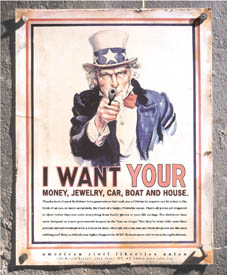This is old. Real old. Many links are broken, and some have just been removed to keep Google happy. So if you find a link to nowhere, that's why.
|
|
Now that I'm not employed (and due to this have been blessed with even more time to waste on the internet), I find myself reading a lot more about the issues on privacy, censorship, and general government intrusion into our lives. Is this something that automatically happens when you don't have a job? It's obvious that more than a few of the people involved in this go a wee-bit over the edge on conspiracy theories and such stuff. I hope this isn't just one of those "gateway" interests that will just lead to harder anti-government beliefs. There ought to be a law.
There's a lot of alarming stuff going on. This page provides some general information on what is happening, as well as links to some of the more important sites that are involved in trying to fix the mess.
There won't be much new anti-Shrubya stuff, that's just too easy. Just look in the box to the right, then I'll be done with it. Well, maybe just this one last comment: it sure seems like a lot of the Bush humor sites have been disappearing lately. Coincidence?
911 footnote:
Most of this was put together before Sept. 11, and now it's safe to also include the War on Iraq that's about to start. It wasn't PC to make fun of GW for a while, but it didn't last long. It caused me to put up this section, which used to be sort of a disclaimer. GW the person didn't change, but what surrounds him did. He got a lot of support because of Sept. 11. But GW still says stupid things, so the links to humor about him stay.
This is definitely a time to be concerned about government intrusion and privacy rights. People are willing to give up a lot in the wake of an event like the WTC bombings, and the government often moves quickly to take advantage of these types of situations. One bill was passed in just 30 minutes -- normally this would have taken months, if it had passed at all. Other bills are being proposed to further limit privacy while public support is high. Stay on watch.
"Those who would give up essential liberty to purchase a little temporary safety deserve neither liberty nor safety." -- Benjamin Franklin
|
Links on this page Privacy
Censorship (in a broad sense)
Out of Bounds? - Some scary stories |

Ways to get off this page |
